Best Overall Electric Bike
Ride1Up 700-Series
REASONS TO BUY
Excellent performance for the price
Great features
Strong motor
Excellent range
REASONS TO AVOID
More involved assembly
Heavier weight
The Ride1Up 700-Series is a full-featured e-bike with sleek looks and performance that exceeds the asking price. This bike provides a smooth ride on 27.5″ wheels with 100mm of front suspension. We used this bike for longer-distance commutes and found very few reasons to complain. The mighty 720Wh battery means it has the juice to power through longer rides, while the powerful 750W motor easily supports 20 mph using the throttle or up to 28 mph with pedal assist. Ride1Up provides two frame options, step-over or step-through style, available in two frame sizes. The bike features highly adjustable components, allowing riders to customize its fit. Additional baskets and rack attachments are available as add-ons to help you bring your gear along. This bike’s comfort and convenience-oriented features add some weight, but good handling and balance compensate for the extra pounds. It also features a rear rack, fenders, and lights, so you’ll be ready for wet or dark roads.
Our least favorite part of the 700 Series was the extra time and effort we put into the assembly. This bike comes less assembled than others we’ve tested, and all the additional features take longer to assemble during the initial unboxing. However, this is a one-time task, so we wouldn’t base our final purchase decision on this factor and might encourage wary consumers to take it to a bicycle shop for assembly. The bike is above average in the weight department, so it doesn’t exactly feel nimble, but we found it easily maneuverable in most situations. Ultimately, we were impressed by the power, range, comfort, and ride quality the 700-Series provided, not to mention the competitive price. It is perfect for around-town commutes, errand runs, or outdoor adventures. It has similar performance to the Ride1Up Cafe Cruiser. The Cafe Cruiser has a relaxed disposition, a welded rear rack that can hold up to 130 lbs, and comes with more stylish and comfortable handlebars. However, it’s a bit more expensive and offers slower handling.
Read more: Ride1Up 700-Series review
Not only did the 700- Series excel in all of our testing metrics, it was a pleasure to ride.
Credit: Joshua Hutchens
Best Bang For Your Buck Electric Bike
Ride1Up Turris XR
REASONS TO BUY
Economically priced
Class 3 speeds
Built-in battery
Comfortable front suspension
Comes in two frame styles and multiple color options
REASONS TO AVOID
No cargo rack included
Tires create resistance
What a great bike for the money. Our testers were delighted by the ride quality of the Ride1Up Turris XR, especially considering its affordable price. This budget-friendly bike surpassed several more expensive models in our review, earning it a top rating. With a powerful 750W motor, this Class 3 model quickly zips up to 20 mph with the throttle and as fast as 28 mph under pedal assist. The functional and stylish frame houses a 614Wh battery, providing a respectable range. The 27.5-inch wheels are fast, and the durable knobby tires offer vibration damping and utility. Despite its stability, the bike remains fairly agile and responsive. The Turris features less adjustability than others, but its general geometry and quality touch points should make it comfortable for most riders in its recommended height range. The bike is available in both step-thru (5’1″-6’2″) and step-over (5’6″-6’4″) frames.
The Turris XR is an affordable bike with some nice comfort features like a suspension fork, fenders, a headlight, all-terrain tires, and a kickstand. It positions you upright in a comfortable and relaxed riding position. Despite not being a particularly sporty bike, it has a 750W motor that feels quite potent. While some minor mechanical issues were reported, the bike’s overall quality and value make it an excellent choice for those exploring bike paths and beyond. Its main competitor is the Ride1Up 700 series, which has a larger battery and comes with a rear rack. Whether the price difference is worth the 700 is a personal decision. Another excellent value is the Lectric XP 3.0. It’s a folding model, but you wouldn’t know it based on ride quality. The XP 3.0 has excellent range and power and includes many comfort features we appreciated in the Turris. The Turris and XP 3.0 feel higher quality and have larger batteries than the other bikes in our Budget Electric Bike Review. Those two bikes are outstanding values, even next to bikes that are a fraction of the price.
Read more: Ride1Up Turris XR review
Calm and relaxed, the Turris was built to cruise with or without your added effort.
Credit: Joshua Hutchens
Best Overall Cargo Bike
Aventon Abound
REASONS TO BUY
440 lb weight capacity
Large, versatile rack
High-quality, low-price
Massive range
REASONS TO AVOID
Needs accessories to unlock its utility
Heavy
Slow to power on
The Aventon Abound is a fantastic little cargo bike with serious hauling capabilities. This Class 2 cargo hauler has a 750W hub motor that quickly pushes to 20 mph by pedal assist or throttle. Power is smooth and abundant thanks to a 720Wh battery and torque sensor. The Abound has a class-leading range and a 440-pound capacity, 143 pounds on the rack alone. The rack can host an abundance of accessories that unlock its different purposes. Hauling kids, cargo, coolers, surfboards, you name it. The bike manages to feel huge when it comes time to load and small when it’s time to park due to its 20″ wheels. A suspension fork and supple rubber offset the ride quality of the smaller wheels. The seated position is upright, with a commanding view, and a dropper seatpost allows you to be flat-footed quickly. The seatpost and front end offer a wide range of adjustments to suit riders from 4′ 11″ to 6″ 3″. Fenders, wheel guards, a storage box, and lights that run off the bike’s battery are standard. There is also a working brake light and turn signals.
Like other cargo bikes, the Aventon Abound is heavy, but the motor’s steady power masks its weight. The 20″ wheels keep the bike’s size in check but don’t roll as smoothly as the 24″ wheels on the Blix Packa Genie. We highly recommend the Abound, but if price is your guiding factor, you’ll love the Lectric XPedition. The Xpedition offers very similar capabilities with only a slight reduction in refinement.
Read more: Aventon Abound review
The Abound sets the bar for ease of use, the bike makes it easy to replace car trips.
Credit: Natalie Kafader
Most Useful Electric Bike
Specialized Globe Haul ST
REASONS TO BUY
Great ride quality
Easy to store
Exceptional range
Expansion possibilities
REASONS TO AVOID
Accessories aren’t as cool as the bike
Only room for one kid
Striking a delicate balance in the cargo bike market, the Specialized Haul ST is useful without overly imposing. Its small footprint makes for easy storage and agile handling, while its burly frame and solid spec ready it for heavy-duty service. The ride is fun, with 3.5″ tires soaking up the bumps. This bike’s versatility is a defining feature; it’s not too much bike for commuting, and it’s enough bike to haul groceries or a single child. If the purpose of this bike was to make replacing trips made by car convenient, it succeeds, and it is probably the most useful product of all in our best bike reviews.
The bike feels really well thought out and incredibly customizable. Specialized offers a bevy of accessories that enhance its capabilities, or you can create your own using the T rail rack. It features a large (772Wh) battery and a 700W motor, giving it more than adequate power and a class-leading range. From the handlebar to the spokes, the bike is ready to haul its maximum of 419 pounds. A unique short tail frame design makes the bike easy to turn, park, store, and carry on a bike rack while only mildly diminishing its utility. Those wanting to haul two kids or have a dedicated kid corral on the rear rack should consider the Blix Packa or RadWagon. Its main downside is the cost of the bike and accessories. For example, we had to pay extra for a throttle, something few other eBike manufacturers ding you for. While the plastic cargo bins perform better than any pannier we have used, they are not cheap. We didn’t love the other accessories offered with this bike (or their cost). Still, overall, the bike is an absolute winner for doing exactly what the name implies: hauling many items you normally need a car to carry. If you can’t get over the price and want a useful bike for a lot less, check out the Aventon Abound or Lectric XPedition. They’re a bit longer, but both roll on 20″ wheels.
Read more: Specialized Haul ST review
Long-Term Thoughts: The Haul ST was such a fun and useful bike we had to keep it. After 1100 miles, we’ve had to replace the battery charger under warranty, replace the broken pedals, and fix a flat tire. Overall, we love the bike, using it as frequently for commuting as we do carrying cargo. We wish the power button were more prominent, especially on days we’re gloved.
Replacing car trips is so easy with the Haul ST.
Credit: Joshua Hutchens
Best Value Cargo Bike
Lectric XPedition
REASONS TO BUY
Easy on the wallet
Solid power
Great range for the price
Large capacity to haul
REASONS TO AVOID
Acceleration could be smoother
Small wheels mean a bumpier ride
No suspension
The Lectric XPedition delivers much cargo capacity for the dollar. It has power and capability for hundreds less than comparable models. The 750W motor delivers 1350 watts, and the 672 battery gives a respectable range. You can haul up to 450 pounds. Its smaller size and wheels make it relatively agile for a cargo bike. It comes fully featured with a great display, fenders, lights, and a telescoping seat that is fast to adjust. Additional accessories are available at reasonable prices to enhance this bike’s utility.
The smaller size and wheels make this bike less stable at higher speeds than some higher-scoring (and more expensive) models. There is also no suspension; this bike does not ride great on rough roads. That said, for the price, the XPedition offers a ton of fun and utility and is what many people will be looking for in a cargo bike. If you want something just a bit more refined that happens to have more range, check out the Aventon Abound; it’s a delight to use. The Lectric XP 3.0 isn’t a cargo bike, but its welded rack capable of carrying 150 lbs lets it impersonate one pretty well.
Read more: Lectric XPedition review
Under a full load, the XPedition still delivered a smooth ride and solid handling.
Credit: Joshua Hutchens
Most Stable Cargo Bike
Rad Power RadWagon 5
Battery size: 720 Wh | Max weight capacity: 375 lbs
REASONS TO BUY
Remarkably stable
Easy accessory integration
Excellent display quality
Comfortable ride
The RadWagon 5 is the most stable cargo bike we’ve tested. With several generations of improvements, the bike is also more user-friendly than ever. Rad completely redesigned the RadWagon with a bevy of comfort features, giving it new wheels, suspension, a brilliant display, and a lower center of gravity. They also doubled down on safety, giving the bike more powerful brakes, turn signals, and a new Safe-Shield battery technology designed to prevent thermal runaway.
A solid collection of components contributes to the comfortable ride quality and competent demeanor. With a weight capacity of 375 pounds, there aren’t many loads the RadWagon 5 can’t carry. This bike has a new, wider 750-watt motor and a torque sensor that provides smooth, predictable acceleration in any of its five pedal assist modes, and the throttle gives access to full power with just a twist of the wrist. Easily swappable classes make this bike more versatile, and a large battery gives it sufficient range for most people. The bike feels incredibly stable and easy to ride; the other side of that coin is that it’s heavy and not very sporty feeling. For better or worse, this is the old Volvo wagon of cargo bikes.
Read more: RadWagon 5 review
However you want to use a cargo bike, the RadWagon has you covered.
Credit: Joshua Hutchens
Best Fat Tire Electric Bike
Aventon Aventure.2 Step-Through
REASONS TO BUY
Potent motor
Comfortable fat tires are great on various surfaces
Large battery with respectable range
Aventon smartphone app
REASONS TO AVOID
Large tires can feel sluggish on pavement
Heavy
Are you looking for a versatile bike that can handle all kinds of terrain? The Aventon Aventure.2 Step-Through may be just what you need. With its 4-inch wide tires and comfortable front suspension, this bike offers stability and smooth rides, ideal for exploring dirt roads or leisurely trails. The 750W motor feels potent and can reach speeds up to 28mph with pedal assistance. It boasts a 720Wh battery, providing a respectable range. Sleek and stylish, the bike has a frame-integrated battery and complimentary components. Step-through and step-over style frames are available in two sizes. The Aventure.2 boasts a vibrant color display and easy-to-use controls. Fenders and lights, a rear rack, and even turn signals integrated into the frame ready the bike for rain, darkness, and urban environments. This bike is perfect for exploring, whether on an adventure or just commuting.
The most significant drawback to the Aventure.2 is its weight. At 77 pounds, it is a big, bulky bike that isn’t very easy to transport. It is a little too heavy for most bike racks, and it can be challenging to load it into the back of a truck or move up a flight of stairs. Removing the battery from the bike is quick and easy and brings the bike’s weight down to 68 pounds, which is light enough to work with several hitch racks. While the 4-inch wide knobby tires are great for tackling a wider range of surfaces, they can feel sluggish on the pavement and make the handling response feel more delayed. Beyond those concerns, it is a great option for riders who want fewer limitations on where their electric bike can take them. If you like the comfort and versatility of the big wheels, you may also want to consider the Blix Ultra that has similar specs. The Ride1Up Rift is another impressive fat tire electric bike with more power, more range, and even more weight, but it also has more relaxed geometry and a bit more suspension. It includes a rack capable of carrying 150 pounds, and Ride1Up sells a passenger kit that allows you to bring a friend.
Read more: Aventon Aventure.2 Step-Through review
This wouldn’t be a possibility on most bikes, riding down the beach is quite nice.
Credit: Joshua Hutchens
Best Value Electric Gravel Bike
Ride1Up CF Racer1
Frame Material: Carbon Fiber | Weight: 28 lbs 6 oz
REASONS TO BUY
Full carbon frame and fork
Excellent value
Impressive build
Lightweight electric drivetrain
REASONS TO AVOID
Limited adjustability
Only available in two sizes
The CF Racer1 is an incredible value in the ebike market. You can buy this bike as a gravel or road bike with an impressive build kit and an even more impressive price. Ride1Up sells directly to the consumer and eliminates the bicycle shop, providing substantially lower prices. The bike has a (252Wh) downtube battery and a 250-watt hub that gives you just enough assistance. The electric drivetrain adds some weight, but the bike is only 28 lbs without pedals. That’s light enough to ride it without even turning the battery on. The geometry is sporty, quick on the road, and fairly capable off-road. The steeper angles mean it behaves better at slower gravel speeds but remains quite comfortable.
The carbon cockpit and Rival drivetrain aren’t usually found on a bike at this price point. The road build has less flared handlebars, aero rims, a smaller cassette, and wide road tires. Both models can be had with a range extender battery that doubles the bike’s range. Rack and fender mounts add some versatility, and dual bottle mounts, including a three-pack mount on the downtube, give you lots of carrying capacity.
A carbon one-piece bar stem looks really cool but lacks adjustability. The bike uses Ride1UP’s (CBCS) Current Based Cadence Sensor, which gives it more sensitivity than a traditional cadence sensor, and it’s good, but not great. Overall, the bike is as spectacular as its paint job, and if you fit one of the two sizes it’s available in, scoop it up.
Read more: Ride1Up CF Racer1 review
The CF Racer1 really stands out with its performance and value.
Credit: Matt Lighthart
Best Folding Electric Bike
Blix Vika+ Flex
REASONS TO BUY
Powerful and quick
Included features
Large range of fit
More portable than other top-rated folding models
REASONS TO AVOID
Fairly expensive
Rigid frame transmits bumps
The folding electric bike test gave the Blix Vika+ Flex top honors. It received high marks in all rating metrics. This small yet powerful bike has a robust 500W motor, allowing for quick acceleration and a top throttle speed of 20 mph. Using pedal assist, it can reach up to 24 mph. Its 614Wh battery holds enough power to travel long distances, impressively traveling 27.5 miles in our throttle-only range test. The bike handles well for a folding model, with good stability at high speeds and predictable steering. The powerful hydraulic disc brakes provide excellent control and stopping power. It also has a wider range of fit than most competitors, with a highly adjustable seat and handlebar. The Blix Vika+ Flex has several useful features, including integrated lights, fenders, and a sturdy rear cargo rack. At 51 lbs and 14 oz, it is significantly lighter than other top performers and folds down small for easy portability and storage.
We found the Vika+ Flex to be our test group’s most well-rounded folding model, but it still has some minor drawbacks. With a rigid frame and comparatively narrower tires, it sometimes feels less forgiving over rougher terrain. Of course, the nature of its folding design and smaller wheels means it doesn’t have the same composure as the larger wheeled, non-folding competition. It has a respectable range, but it was bested slightly in that metric by bikes with bigger, heavier batteries. Those concerns aside, the Vika+ Flex proved to offer a high level of performance in a convenient folding package, making it the best folding model we tested.
Long-Term Thoughts: After testing the Blix, we didn’t want to get rid of it; the bike’s compact folded size makes it so convenient. The main difference between this folding electric bike and others tested is that the Blix actually feels compact and less cumbersome when folded. While folding or unfolding the bike, a cable disconnected underneath the cable wrap, preventing it from powering on. Blix customer service was able to troubleshoot the issue quickly, telling us where to unwrap the cable to find the problematic connection.
Read more: Blix Vika+ Flex review

The Blix Vika+ Flex is a high-performing folding model that boasts portable and storable convenience.
Credit: Abriah Wofford
Best Bang for the Buck Folding Electric Bike
Lectric XP 3.0 Step-Thru
REASONS TO BUY
No assembly required
Folding frame
Versatile tires expand it’s use
Excellent value
Easy to make Class 3
REASONS TO AVOID
Shorter wheelbase is less stable
Average range
The Lectric XP 3.0 is a folding electric bike that will fit in the trunk of your car, next to your office desk, or in the hall closet for storage. Despite its compact foldable design, the bike features loads of adjustability to suit a wide range of user heights. It has user-friendly features like a cargo rack, fenders, lights, a comfortable seat, and ergonomic grips. Lectric sells additional accessories, even a passenger seat if you want additional conveniences. With a robust 500W motor, the XP 2.0 packs a lot of power in a small package and can speed up to 28 mph using pedal assist and 20 mph with the throttle. A 500Wh battery integrates into the folding frame, which provides a respectable range given its smaller capacity (a long-range battery is also available for an additional fee). With 3-inch wide knobby tires and a suspension fork, it provides a relatively smooth ride on various surfaces. We also love how easy this bike is to use straight out of the box. It comes almost completely assembled and takes little time and effort to set up and start riding.
The small size has both pros and cons. It is easy to store, but the battery is smaller, giving it predictably less range. The shorter wheelbase and taller handlebar give it a nervous feeling at speed. The tight turning radius allows for good maneuverability, and the bike never felt unsafe. Though it folds into a compact package, it’s quite heavy at 62.5 lbs, so lifting it into a trunk or carrying it up a flight of stairs can be difficult. This value-oriented foldable model is a great option for anyone short on storage or seeking a compact e-bike.
Long-Term Thoughts: We kept this bike for long-term use and abuse. It’s been treated poorly, stored outdoors, covered in playa dust, and has been totally solid. We added a passenger kit allowing us to carry a friend and replaced the quick-release pedals with pedals that are larger and more stable feeling.
Read more: Lectric XP 3.0 review
The Lectric XP 3.0 is a bargain that happens to be fun to ride and folds up.
Credit: Joshua Hutchens
Best Moped Style Class 3 Electric Bike
Ride1Up Revv 1 FS
Battery Size: 1040 Wh | Measured Weight: 97 lbs
REASONS TO BUY
Incredibly Powerful
Quick and Sporty
Class-leading range
High performance-to-cost ratio
REASONS TO AVOID
Almost 100 pounds
This isn’t exactly a “bike”
We had a great time testing and reviewing the original har-tail Ride1Up Revv 1, but the Ride1Up Revv 1 FS brings more to the table than just full suspension. This little bike made a big impression with its power, comfort, and convenience features. It’s the top-rated bike in our review of class 3 electric bikes. Packing a massive 1040 Wh battery, it provides more range than any other bike we’ve tested. The bike’s 52V electrical system and 1000W hub motor give it the power to easily tackle even the steepest hills.
Ride1Up uses a Multi-Class Speed System that allows you to adjust its output according to the terrain and local laws. By registering the bike, you can unlock an off-road mode, giving it even higher performance for use on private property.
Full suspension, upright handlebars, and a big comfy seat give this bike above-average comfort on all kinds of terrain. Full fenders, lights, turn signals, and a horn give the Revv 1 urban utility and a distinct moped-like feel. The bike’s clear central display is top notch providing riders with all the necessary ride data, day or night.
While not designed for efficient pedaling, its throttle range of almost 40 miles makes that less important. Adventurous riders can even add a second battery to double its range. Assembling the bike is made easy thanks to a box that doubles as a support while you complete the final assembly. Tools and instructions are included, and for the visual learners, there is even an assembly video. The Revv 1 FS is a great choice for running errands or exploring trails, but its weight may pose challenges for transportation. At 100 pounds, there aren’t many bike racks that can support its weight.
Read more: Ride1Up Revv 1 FS review
An exceptional value for exceptional performance, this bike is also incredibly fun.
Credit: Matt Lighthart
Best Electric Mountain Bike
Specialized Turbo Levo Comp
REASONS TO BUY
Large battery size and long-range
Highly adjustable geometry
Powerful motor
Natural handling feel
REASONS TO AVOID
Basic user interface
No longer the leader in the battery size wars
Moderately expensive
Specialized found the perfect balance of power vs. natural handling in the Turbo Levo Comp e-mountain bike. Full-power e-bikes are heavier no matter what. However, the Levo has smooth power delivery (an improvement over the abrupt power cutoff of older versions), is well-balanced, and handles the most like a “regular trail bike” out of any of the models we tested. It has been our our favorite electric mountain bike for years. The latest Turbo Full Power 2.2 motor system is well refined and boasts a whopping 90Nm of torque, more than enough power to propel you up hills that would be unconquerable on a standard bike. Mixed wheel sizes and highly adjustable geometry make the Levo Comp one of the most customizable options available; several minor adjustments make a huge difference and allow you to tailor the bike to different riding styles and terrain quickly and easily. The Levo also ranks near the top of the group for range. We felt confident going on longer rides without the risk of being stuck miles from the trailhead with a 50lb bike and no power.
While this is undoubtedly one of our favorite electric bikes on the trail, there are a few areas where the Levo was not the top performer. The SRAM Code R hydraulic disc brakes on this bike are far from our favorite, and the non-e-bike specific Fox 36 Rhythm fork also leaves a bit to be desired. There is also no digital display screen on this bike. The only information immediately available to the rider are the LEDs on the frame’s top tube showing the current support setting and remaining battery life. If you value having lots of information available at a glance, more expensive versions of the Levo come with a digital display, or you can purchase one as a separate accessory. However, we wouldn’t let either of these drawbacks deter you from the Turbo Levo Comp, and we recommend it to anyone looking for a refined and highly adjustable electric mountain bike. If you want to save a few thousand dollars, check out the Commencal Meta Power TR Ride, which didn’t score as high but has great downhill performance and only slightly less range.
Long-Term Thoughts: The bike reviewed is actually one of several Levo’s that we own and ride constantly. We’ve been thrilled with the frame’s adjustability and ride quality and feel Specialized is ahead of the competition in this segment. We’ve replaced several motors under warranty, and they seem to be getting quieter and more reliable each time. The bikes have not been without faults, particularly in the TCU and motors, but they’ve all been fixed quickly and under warranty.
Read more: Specialized Turbo Levo Comp review
Riding Specialized’s Turbo Levo Comp deep into the Sierras for all weekend testing.
Credit: Gabriel Amadeus Tiller
Best Lightweight Electric Mountain Bike
Trek Fuel EXe 8 GX AXS Transmission
Battery Size: 360Wh (540Wh with optional Range Extender) | Wheel Size: 29-inch
REASONS TO BUY
Trail bike ride characteristics
Stealthy silent power
SRAM AXS Transmission Drivetrain
Range extender battery (optional)
REASONS TO AVOID
High weight-to-power ratio
Expensive
The Trek Fuel EXe 8 GX AXS is a highly advanced e-bike with impressively integrated technology. Its inconspicuous TQ motor is almost silent, the display is flush with the top tube, and the battery is hidden; it doesn’t look like an e-bike. With modern trail bike geometry, ABP suspension, and SRAM’s Transmission drivetrain, it is an absolute trail ripper. The motor has a peak rating of 300 watts of power and 50Nm of torque, which isn’t enough to make climbing effortless but does put some serious wind at your back. The real thrill of this bike comes from the fact that it makes your rides faster and more exciting. It only weighs 10 pounds more than its analog counterpart, and that weight gives it better traction, more confidence, and a healthy dose of power.
Running big wheels and 140mm of travel with a 150mm fork, the EXe is fun and playful. Riders looking to get rowdier can run a 160mm fork or MX with a 27.5″ rear wheel. The bike descends with predictable swagger and confidence but climbs with enthusiasm. The bike’s power contribution rewards your athleticism, helping you climb and ride faster. The trick little motor uses a harmonic pin ring in place of belts and reduction gears, more commonly used in other motors, keeping it compact and lightweight. This gave Trek very few structural limitations or things to work around building this bike, making it feel more like a mountain bike than an e-bike. This high-tech trail bike (that just happens to be electric) is perfect for athletes wanting to ride faster and work on their high-speed technical game. The EXe doesn’t give you a passive motorized experience, it’s just a bike ride but faster and a wee bit more fun.
Read more: Trek Fuel EXe 8 GX AXS Transmission review
Riding like a modern trail bike, the Fuel EXe brings a host of technology that is largely hidden.
Credit: Matt Lighthart
Best Electric Mountain Bike for Range
Canyon Spectral:ON CF 8
REASONS TO BUY
Well rounded performance
A large battery means super long-range
Very competitive price
Quality build for the price
REASONS TO AVOID
Motor/battery bulge reduces ground clearance
Inadequate rear tire casing
The Canyon Spectral:ON CF 8 is one of the top-performing electric mountain bikes we tested. It manages to be more affordable while offering a quality carbon frame and a mostly excellent component specification thanks to Canyon’s direct-to-consumer sales model. At nearly 52 lbs, the Spectral:ON falls in the typical weight range as far as e-MTBs go, yet it handles well and feels balanced on both the climbs and the descents, thanks to the low center of gravity and thoughtful weight distribution. The bike’s geometry is certainly trail-oriented, and it is clear that Canyon intended this bike to be geared more towards all-around riding, but we were impressed when it handled steep drops like a champ. Shimano’s trusty EP8 drive unit handles the power delivery with up to 85Nm of torque and three customizable support settings. One of the most differentiating characteristics of the Spectral:ON is the extensive range; this bike lasted miles beyond the closest competitor in our range test thanks to the huge capacity 900Wh battery.
Unfortunately, all of that battery power has to be stored somewhere. Canyon did a great job keeping the weight low, but the bulge at the bottom of the bike’s frame reduces clearance when riding more technical terrain or if the suspension is ever maxed out. Speaking of suspension, the components on the Spectral:ON work fine but have limited adjustability, and the non-e-bike specific fork could feel a little flexy under braking. Lastly, we recommend running beefier tires, but luckily, this is not a very expensive upgrade. Overall, our complaints about the Canyon Spectral:ON are minor, and it is an excellent option for those who tackle long rides and want a well-balanced trail eMTB that comes at a very competitive price.
Read more: Canyon Spectral:ON CF 8 review
Faster and further than you’re accustomed to, the Spectral:ON has the juice for all-day fun!
Credit: Joshua Hutchens
While it’s hard to come across a free electric bike, if you replace your car trips with an eBike, it will likely save you more in gas, maintenance, and depreciation on your vehicle than the costs of an eBike over 1-2 years. Read more in our free electric bike article
How We Test Electric Bikes
We use a multi-faceted approach to testing ebikes that takes into account the type of bike, its intended use, and what we feel matters the most in each category. Some of the most important metrics we include are ride quality, range, user interface, and power output. We delve deeper into specific categories, evaluating downhill and climbing performance for mountain bikes, carrying capacity for cargo bikes, and folded size for folding e-bikes. In addition to miles of methodical testing on and off the pavement, we build, tune, and maintain these bikes. For Class 2 e-bikes that use a throttle, we test their power output on a modified motorcycle dynamometer.
The bikes get loaded, carried, and hauled around for months, from garages to bike racks to trailheads. We carefully evaluate the nuances of ride quality, measure their angles and weigh them. We spend enough time with each bike to become familiar with it and identify its best and worst attributes. We ride them outside their intended uses and disassemble them to inspect wiring and motor connections. Sometimes, we develop favorites and ride them for extended periods. We have been testing different styles of bikes since 2017, but our team of bike experts has been at it for a combined century.
Why Trust GearLab
Bike testers at GearLab started with mountain bikes in 2017 and have since branched out to include over ten bike categories. We added increasingly popular electric bikes to our lineup in 2019. In that time, we’ve purchased and extensively tested more than 80 e-bike models across various categories, and we’re constantly on the lookout for the latest and greatest e-bikes to test and compare. With more than 1,000 bikes and bike-related products, we’ve had a little taste of it all.
Our team is led by Senior Review Editor, Joshua Hutchens, a lifelong cyclist and bike nerd. Hutchens has spent his life imparting his two-wheeled passion to others. He spent many years guiding cycling trips all over the world with Backroads. He owned and operated one of “America’s Top Bicycle Shops,” as well as being one of the founders of The Lumberyard Indoor Bicycle Park. He’s raced every discipline of cycling and now spends his days testing bikes and coaching mountain biking through his local community college. A meticulous mechanic and lifelong athlete, Hutchens had his first bike shop job in 1986 and is obsessed with bicycles and how we use them.
Long-time Tahoe resident and occasional pro racer Jeremy Benson also contributed his time and knowledge to this review. Benson has been riding bikes for over 30 years and has authored multiple guide books including a great resource for the Lake Tahoe basin, Mountain Bike Tahoe.
Enduring gratitude to Kyle Smaine for his contributions. Smaine was a South Lake Tahoe native, World Champion skier, talented rider, and a meaningful contributor to our reviews.
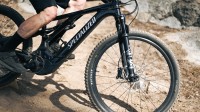
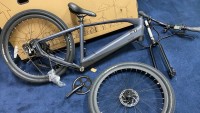

Our multi-faceted hands-on testing process involves lots of real-world riding, handling tests, assembly, and an examination of each bike’s features.
How to Buy the Best Electric Bike for You
Deciding that you want an electric bike over an analog is the first step, and you may think it will be easy to choose a model from there. However, almost every bicycle out there has its e-bike equivalent these days. With so many options, it can be difficult to make a wise decision, but it is possible! Some questions help to narrow down the categories so that, in the end, you are riding the bike that fits your needs best.
Where Do You Want to Ride?
Your lifestyle, location, and budget are probably the three most influential factors when deciding which e-bike will suit you, so you have to ask yourself: Where do I want to ride? The answer to this question will help you narrow down the enormous amount of choices and select an electric bike from the category that will work best for you. For example, if you want to rip around on mountain trails, an e-MTB is the obvious choice. If you live in the city and want to bike-commute to the office daily, a sleek and zippy electric commuter or city bike will be your best bet. To enjoy weekend cruises to the park or beach, you may opt for a bike that prioritizes comfort and cost. If you have kids, pets, or other precious cargo to haul, you’ll select something from the e-cargo bike category. Different classes of bikes will also dictate where you can ride. State, local, and regional regulations vary, so it is best to check if your bike is within the regulations of your area.
Some bikes can be configured to fit into several categories if needed. For example, the speed limit of many class 3 bikes can be adjusted in the bike’s settings to have it top out at 20 mph or class 2, and often, the throttle can be disconnected to fall under class 1.
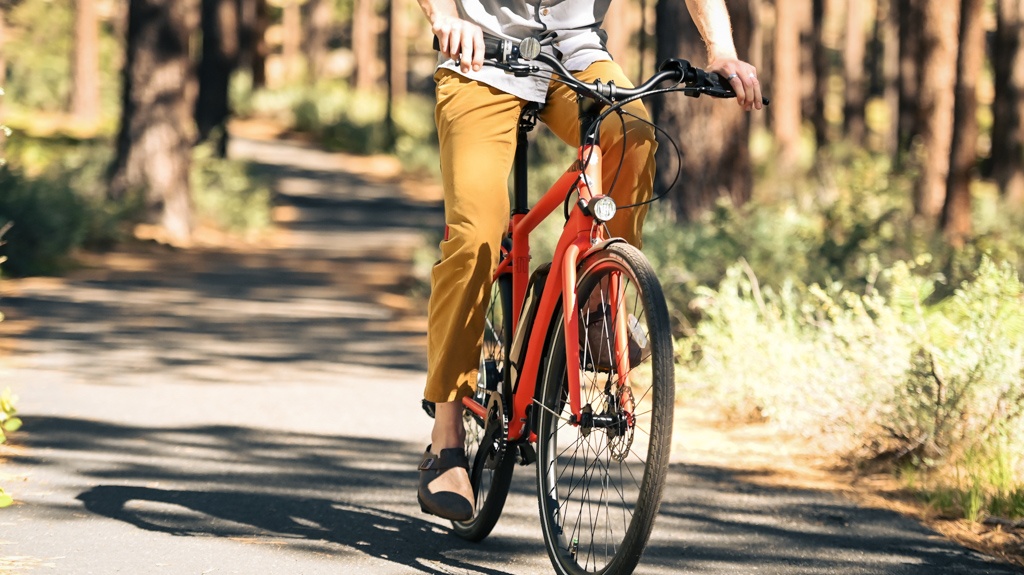
E-bikes fall into three different classes. Class 2 bikes, like the one pictured here, have a throttle and pedal-assist with a top speed of 20 mph.
Credit: Abriah Wofford
Classes of Electric Bikes
The 3-class system is becoming widely accepted as a way to regulate e-bike use, but laws and regulations vary by state and even by country. With some of the more powerful bikes riding the border between mopeds and e-bikes, a bike’s power and speed capabilities determine where you can legally ride them. Some bikes can switch modes, allowing you to ride them anywhere without limitations. Regardless of class, most e-bikes are limited to a motor with one horsepower (750W) or less.
Class 1
Electric bikes that fall into Class 1 are pedal-assist only, which means that power is only delivered when the rider is moving the pedals, and most of the time, there is no throttle on the handlebar. If there is one, it offers an extra power boost, but it only works when the rider is pedaling. Motors on class 1 bikes support top pedal-assisted speeds up to 20mph, and they are typically allowed in bike lanes and multi-use trails, essentially anywhere a regular bike can go. Nearly all electric mountain bikes fall into this category.
Class 2
Class 2 e-bikes also have a top motor speed of 20mph (although it is possible to ride them faster if your legs are strong enough). The main difference between classes 1 and 2 is that class 2 bikes have a throttle, usually a thumb paddle or twist grip on the handlebar, that will propel the bike forward without any help from pedaling input from the rider, putting them more on par with electric scooters. Like class 1, they also have a pedal assist option with different levels of power, depending on your preference. E-bikes that fall into the class 2 category are usually allowed in bike lanes and multi-use paths, but there are exceptions in certain states.
Class 3
Class 3 bikes take it up a notch with a higher speed limit. These bikes have a throttle and pedal assist, with the throttle limited to 20 mph and the pedal assist up to 28 mph. If your legs can push one of these heavy bikes faster than 28mph, kudos to you, but you won’t get any help from the motor after 28 mph. These electric bikes are commonly equipped with a speedometer and a throttle, although not always. These bikes have more restrictions regarding who can ride them and where. You may be required to wear a bike helmet, and in many states, anyone under a certain age is not allowed to ride a class 3 e-bike (usually between 15-16 years) unless they are a passenger, and they are not always allowed on bike paths. However, it is ultimately up to the discretion of the local government, so be sure to check regulations before heading out.
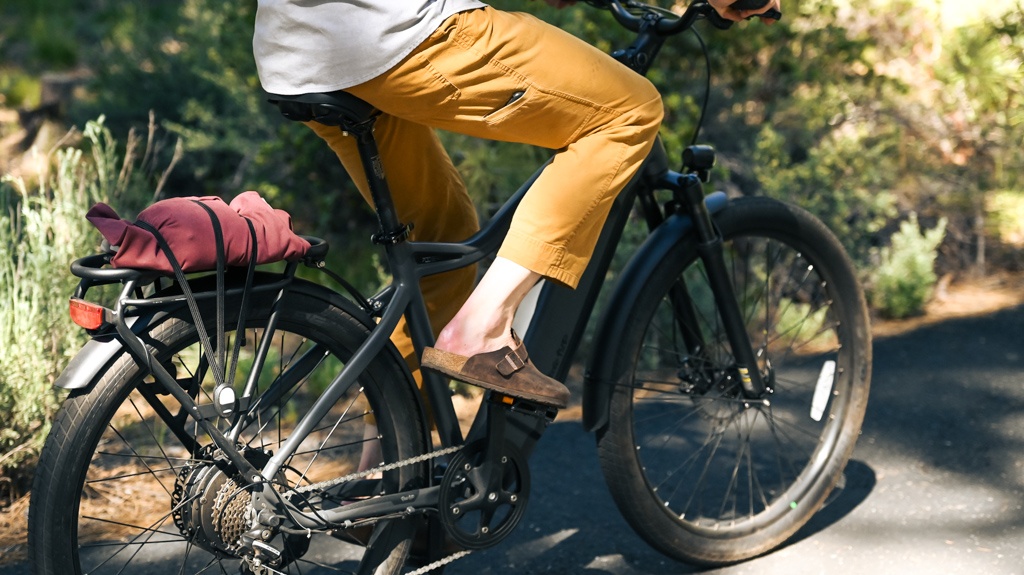
There are many different styles of electric bikes. The Ride1Up 700-Series is one of our favorites for commuting.
Credit: Abriah Wofford
Types of E-bikes
Whatever your preferred riding style, there is probably an e-bike version to fit; if you can’t find one, it’s probably in the making. As electric bikes become more popular, many people are adopting the term “analog” bike to differentiate between motorized and traditional bicycles. While many of the features found on particular styles of e-bikes are the same in the analog world, a few motor or battery-specific details are different. We go over all of this below.
Cruiser Electric Bikes
Cruiser e-bikes prioritize comfort, convenience, and ease of use. They have a more relaxed and upright riding position and are made for long and slow outings down the neighborhood bike path or on the side street that leads to the beach. These typically have a very user-friendly interface and have the option for a step-through frame design to make mounting and dismounting easier for most people. Wider tires make them best suited for rides on the pavement. They may not be as powerful or speedy as some other models, but they provide a boost to your pedaling efforts and are fun and comfortable to ride.
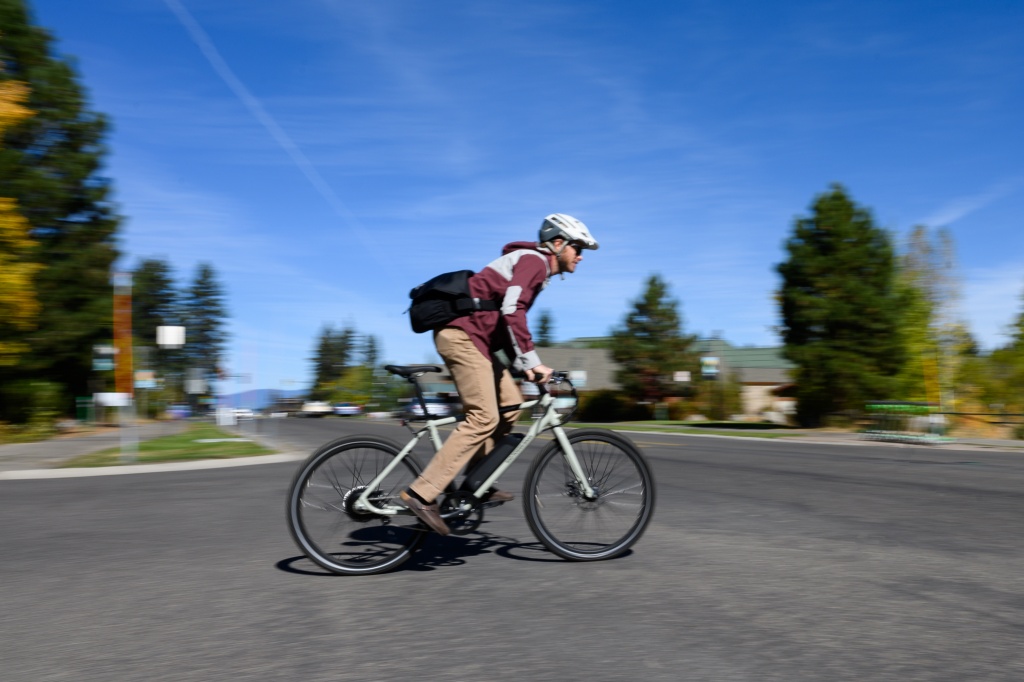
The RadMission’s 500W motor provides plenty of power whether you’re using the throttle or pedal assist.
Credit: Laura Casner
City/Commuter Electric Bikes
Commuter bikes are purpose-built and can potentially replace cars for some riders. They often have quick power output and may operate at higher speeds to keep up with city traffic. Depending on your commute length, you may want to look for a commuter bike with a larger battery to boost the range you can travel. Many include features like headlights, tail lights, and brake lights for enhanced visibility on the road or in an urban environment, and other features like fenders or small racks over the rear wheel add protection from road spray and provide a place to transport some cargo. We have detailed side-by-side tests of the best electric commuter bikes. Below, the chart shows the overall scores of the entire test fleet.
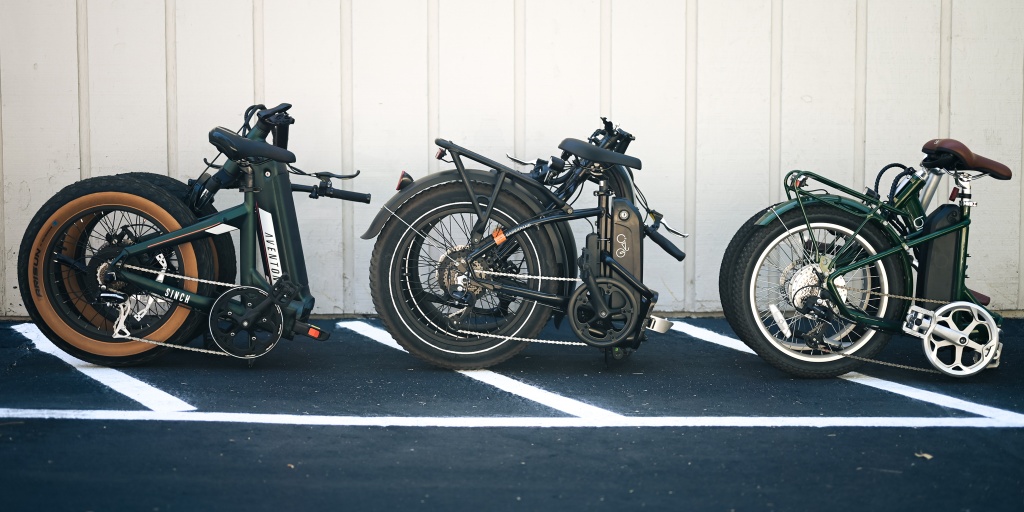
As the name suggests, folding electric bikes can be folded to a more compact size for storage or transport.
Credit: Abriah Wofford
Folding Electric Bikes
As the name suggests, these bikes are designed to fold down to minimize size and maximize portability. Folding electric bikes are aimed at riders with limited storage space or who may need to fit their bike into a vehicle rather than on a bike rack. They are also perfect for those who would prefer to bring their brand-new e-bike inside rather than leave it chained to the bike rack outside (it’s a significant investment, we get it). People who travel with their bikes frequently, RVers, city dwellers, and office workers are the most likely to benefit from this style of bike as the smaller collapsed size takes up significantly less space than non-folding models. One of the downsides to this style of e-bike is that they typically have smaller diameter wheels, tall handlebars, and geometries dictated by their folding designs that can result in slightly less stable handling. If you’d like to see how they compare, check out our side-by-side analysis of the best folding electric bikes. This chart shows the overall scores of all bikes in the test.
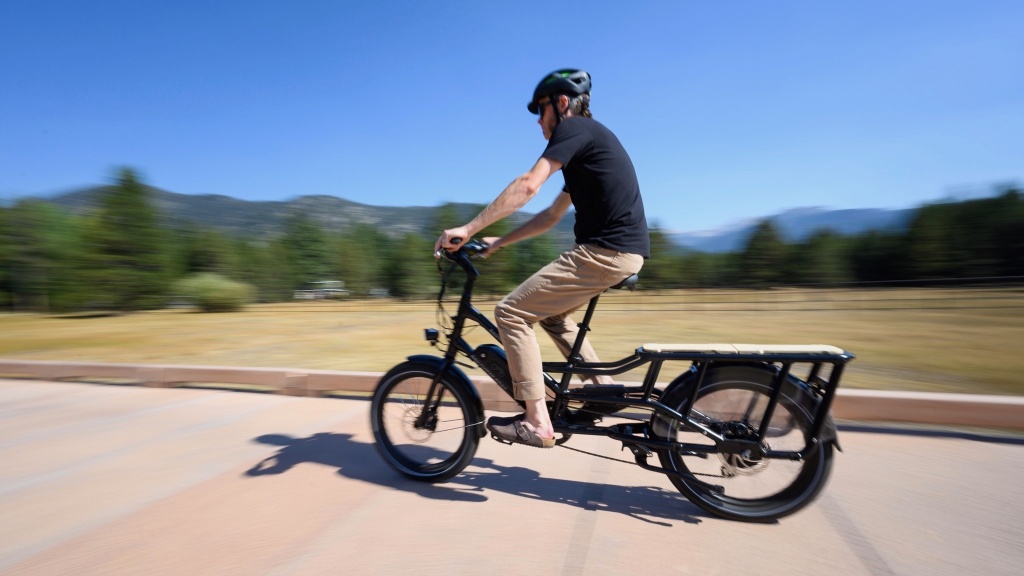
While not particularly agile, the RadWagon 4 is stable and comfortable.
Credit: Jason Peters
Electric Cargo Bikes
In our opinion, the best cargo bikes are more likely to replace a car for most people than any other style of electric bike. Add a motor to this style of bike, and you’re that much closer to living car-free. Often, these bikes are extra long to accommodate a larger rear cargo rack or have a box/wheelbarrow-style cargo space in the front or rear of the rider. A dual kickstand is also a common feature to help support the added length and heavier weight. Most brands that produce cargo bikes also sell various accessories to tailor the storage/cargo space to your needs. Items like front/rear baskets, bike trailer attachments, child seats, and mounts for your favorite bike pannier bags can add space and customize cargo-carrying capability. This larger hauling capacity and extended length can mean trickier handling and a much heavier bike. These models are not very portable and are best suited to those who can ride them straight out of the garage. We’ve performed exhaustive testing of the best cargo bikes. The chart below shows how all those bikes compared to one another.
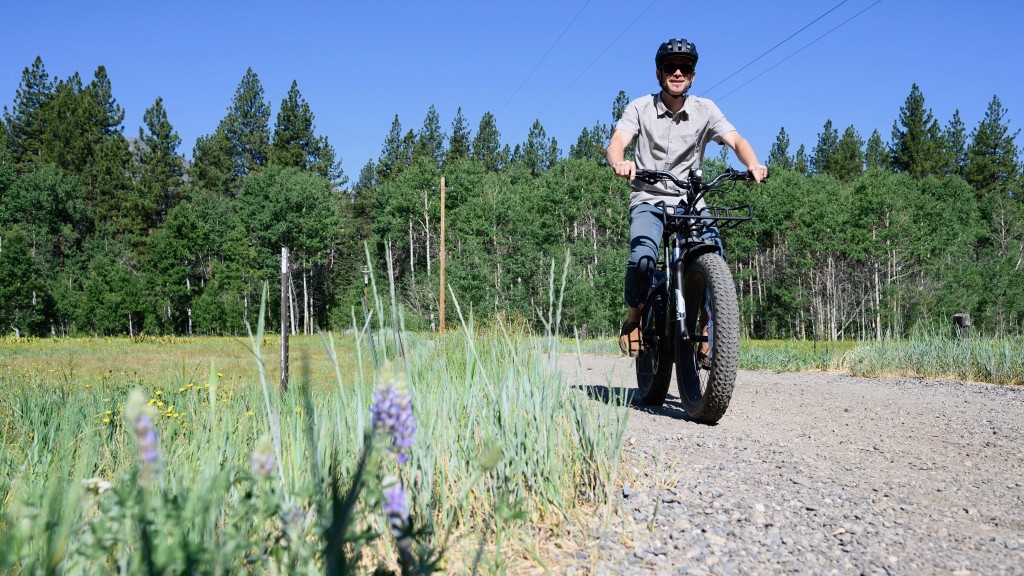
Fat tire e-bikes have knobby tires that expand their surface versatility and put fewer limitations on where you can ride.
Credit: Laura Casner
Fat Tire Electric Bikes
Fat tire electric bikes feature extra wide and often knobby tires, much like their analog counterparts. The higher volume of the tires increases the contact patch, so they float better over soft conditions like sand and snow, and they also dampen the ride enough that these bikes often don’t have a separate suspension system. Tires can range from 3.7″ to 5.2″ wide, compared to the 1.75″ to 2.21″ width found on most standard bikes, increasing traction and stability and making them suitable over a much wider range of surfaces. Because of the larger tire size, analog fat tire bikes tend to move slowly and steadily, so adding a powerful motor helps to propel you through varying terrain and surface conditions more quickly. (See our favorite non-electric fat tire bikes in our dedicated review.)
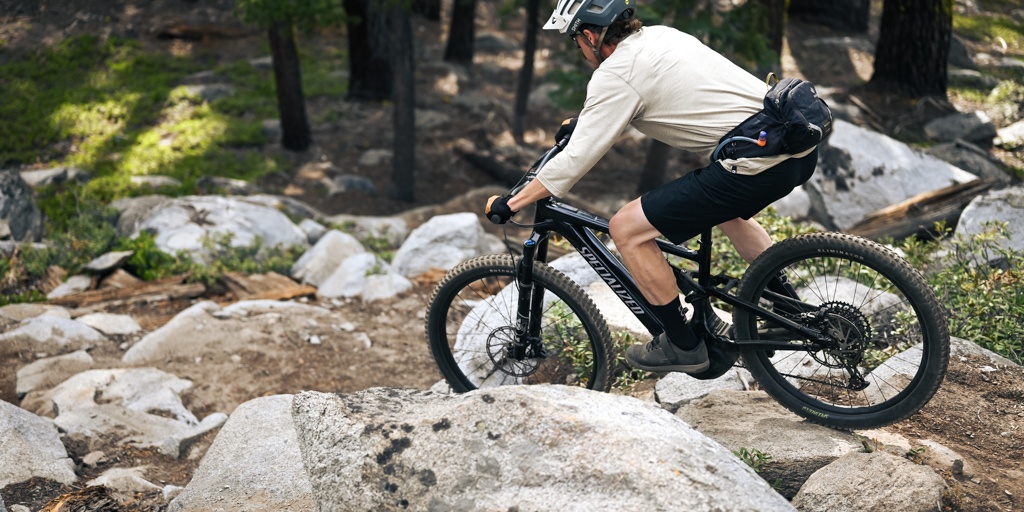
We take every e-MBT out for laps on some of the gnarliest trails we can find to push them to their limits.
Credit: Abriah Wofford
Electric Mountain Bikes
E-mountain bikes are built for off-road use and are equipped to handle steep ups and downs, just like their analog mountain bike cousins. They are often some of the priciest options available, but they are built with quality components like rugged suspension systems, light(er) weight frames, beefy tires, and frame geometry that make them well-suited to riding rougher trails. The motors on e-MTBs are typically regulated to class 1, with multiple pedal-assist levels and top supported speeds of 20 mph. We recommend gearing up with the proper protective gear like a well-fitted helmet and sturdy knee pads. Our testing of the best electric mountain bikes is thorough and ongoing. To see an overall comparison of bikes tested so far, check out the chart below.
Electric Road Bikes
As with traditional road bikes (and gravel bikes too), their motorized counterparts have sporty forward-leaning geometry, narrow tires, and lightweight frames, all with performance and efficiency in mind. Keeping that in mind, many analog road bikes can exceed the 20mph power cutoff of e-bike motors when on flats and downhills. E-road bikes are inevitably heavier due to the battery and motor, so you may end up hauling dead weight through these sections of your ride. However, if you ride in an area with many hills, you’ll probably appreciate a little pedal assist occasionally. Fancy carbon frames and sport-specific builds can often make them pricier than other categories of e-bikes.
Electric Gravel Bikes
Striking a balance between road and off-road use, gravel bikes are the Swiss Army knives of versatility. Adding a motor only enhances this versatility and can expand your riding range. Electric gravel bikes strive to keep the weight low and generally offer less assistance. Benefiting from a multitude of handlebar positions and a more upright position, e-gravel bikes are a comfortable option for long days of exploration.
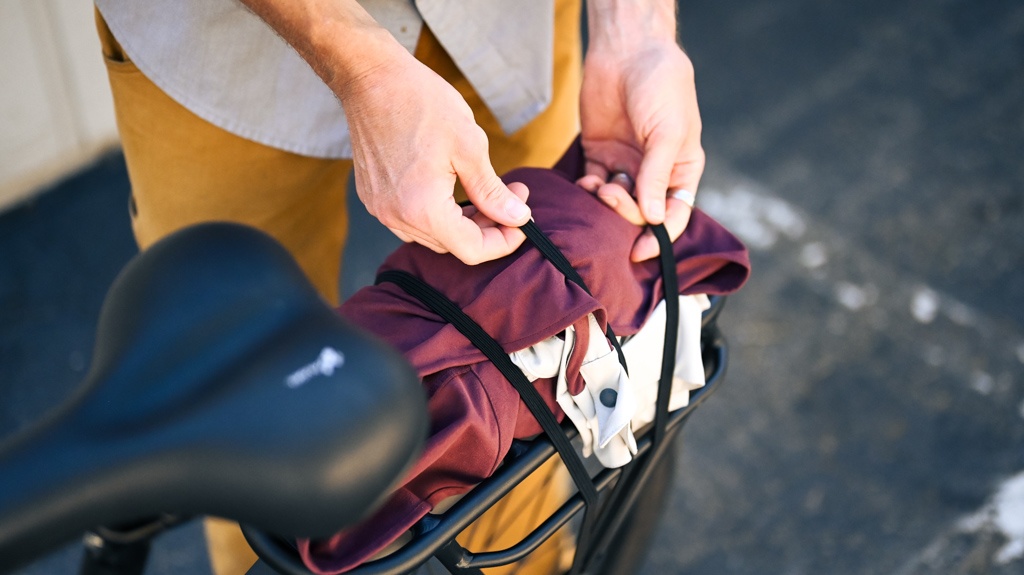
The 700-Series comes with great features, and even small details like the bungee for the rear rack are covered.
Credit: Abriah Wofford
What Else to Consider
Now that we’ve covered the main groups of e-bikes, you’ve probably had a chance to narrow down your top picks. When it comes down to the finalists in your list, these features and specs can help you narrow your choices even further.
Motor and Battery Specs
Most e-bikes have a range that falls between 20-30 miles. Battery size and motor power will determine the approximate range. Still, additional factors like rider weight, terrain, and the amount of pedal assistance or throttle used will also play a major role. Not surprisingly, a little leg power from the rider can add many miles to a bike’s range. Batteries are measured in Watt-hours, and the higher the Wh number, the more power storage and longer the range, but this also means increased weight and size, making for a heavier bike.
There are also several options regarding motor size and placement. Most e-bike motors span the range of 250W to 750W. Larger motors generally produce more torque, accelerate faster, and easily support higher speeds. Hub-drive motors are located in the center of one of the wheels (typically the rear wheel) and transfer power directly to the wheel where it is mounted. These are more affordable, easier to maintain, and do not add as much wear and tear to bike components. However, their single-gear ratio makes them less efficient, and it’s more difficult to change or repair tires. Mid-drive motors are located in the bike’s center, usually around the pedal crank, and deliver power to the wheel through the chain. They’re usually pricier but also more refined, using the bike’s gears to maximize efficiency, and they better balance the weight of the motor. Mid-drive motors are typically found on more expensive electric bikes.
Pedal-assisted power delivery options include a torque sensor or a cadence sensor. Torque sensors measure how hard you pedal using a strain gauge and deliver the appropriate power for the rider’s chosen setting. While usually more expensive, torque sensors can feel more intuitive and natural because they adjust quickly to the rider’s movements, providing more power when you pedal harder and less power when the pedals slow down.
Cadence sensors work more like an on/off switch. When you begin to pedal, the motor provides power, but the output usually needs to be manually adjusted using the controls on the handlebar. Some cadence sensors are a bit “smarter” because they can count pedal rotations (but still do not sense how hard you are pedaling) to adjust power output automatically. This type of system is usually more affordable.
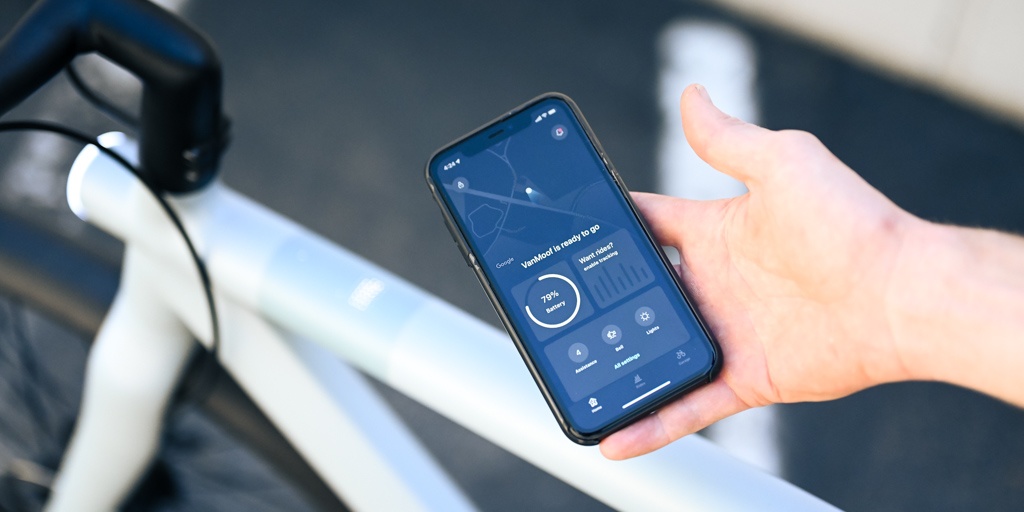
The VanMoof app is an integral part of using the S3. Here you can configure settings, track rides, and a whole lot more.
Credit: Abriah Wofford
Features and Accessories
The last things to consider are ease of use features and included accessories vs. accessories that come as a separate purchase. The user interface varies from bike to bike; some show minimal information like battery level and power setting, while others include speed and other stats about your ride. Some models have an app to track your ride and adjust settings on your smartphone.
While almost always available as aftermarket accessories, it included perks like a headlight, tail light, fenders, and cargo racks, which are nice additions. Many brands also offer additional accessories like baskets and kids’ seats designed specifically to fit their bike models so you can customize your ride. Most bikes these days have a removable battery, which makes charging as simple as carrying the battery to the nearest outlet rather than having to haul the entire bike over. It could also be considered an additional security measure or a way to lighten your bike while transporting it on a bike rack.
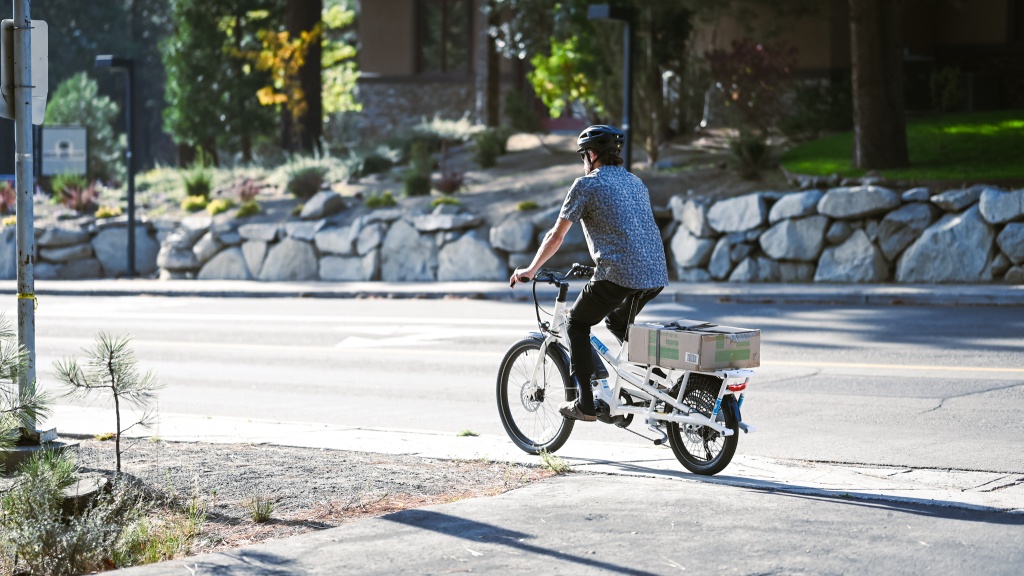
Testing cargo capacity of the Spicy Curry.
Credit: Abriah Wofford
Conclusion
With such a wide variety of electric bikes available, there is sure to be a perfect model for you, but the sheer number of options can be overwhelming if you are new to the market. It is essential first to evaluate your lifestyle and do your research so you can make an informed decision; luckily, we put in the hours of research to help lighten the load. Hopefully, we have brought you closer to your dream bike so that you can spend less time in front of a screen and enjoy your electric bike more. Happy riding.


